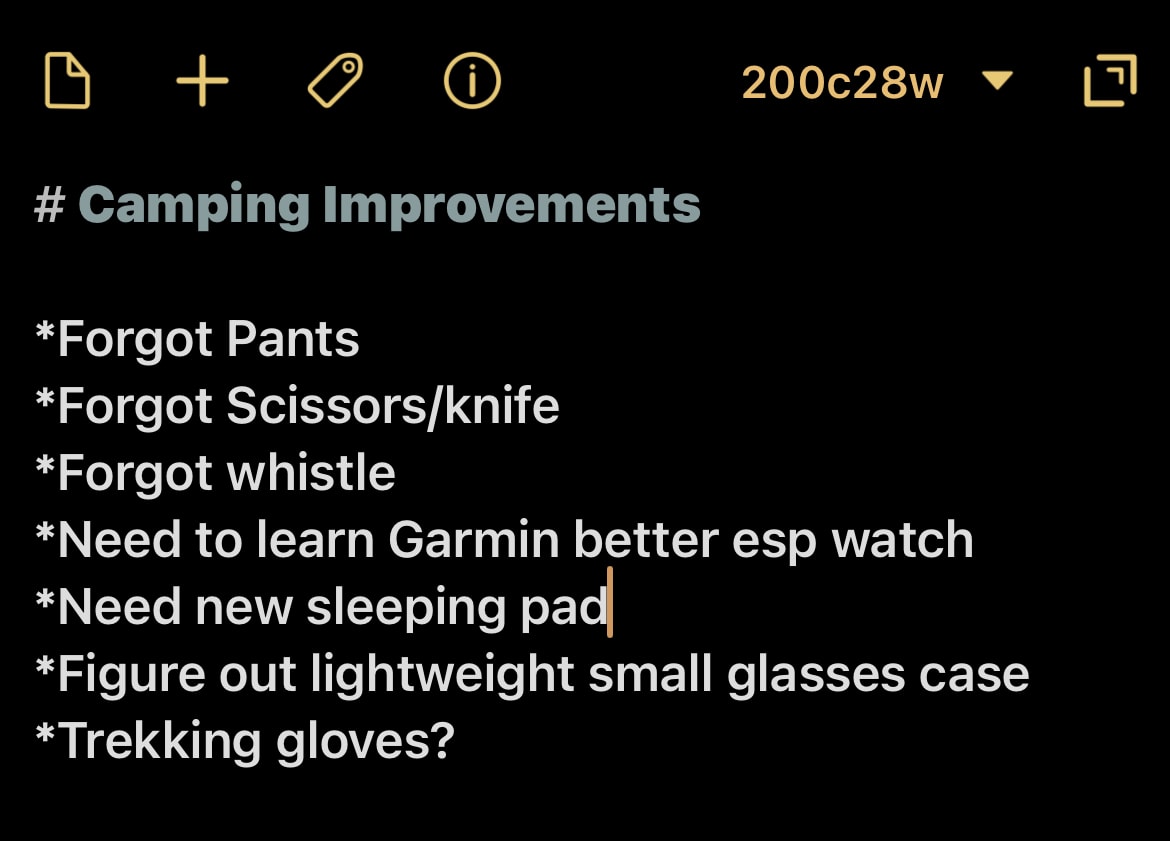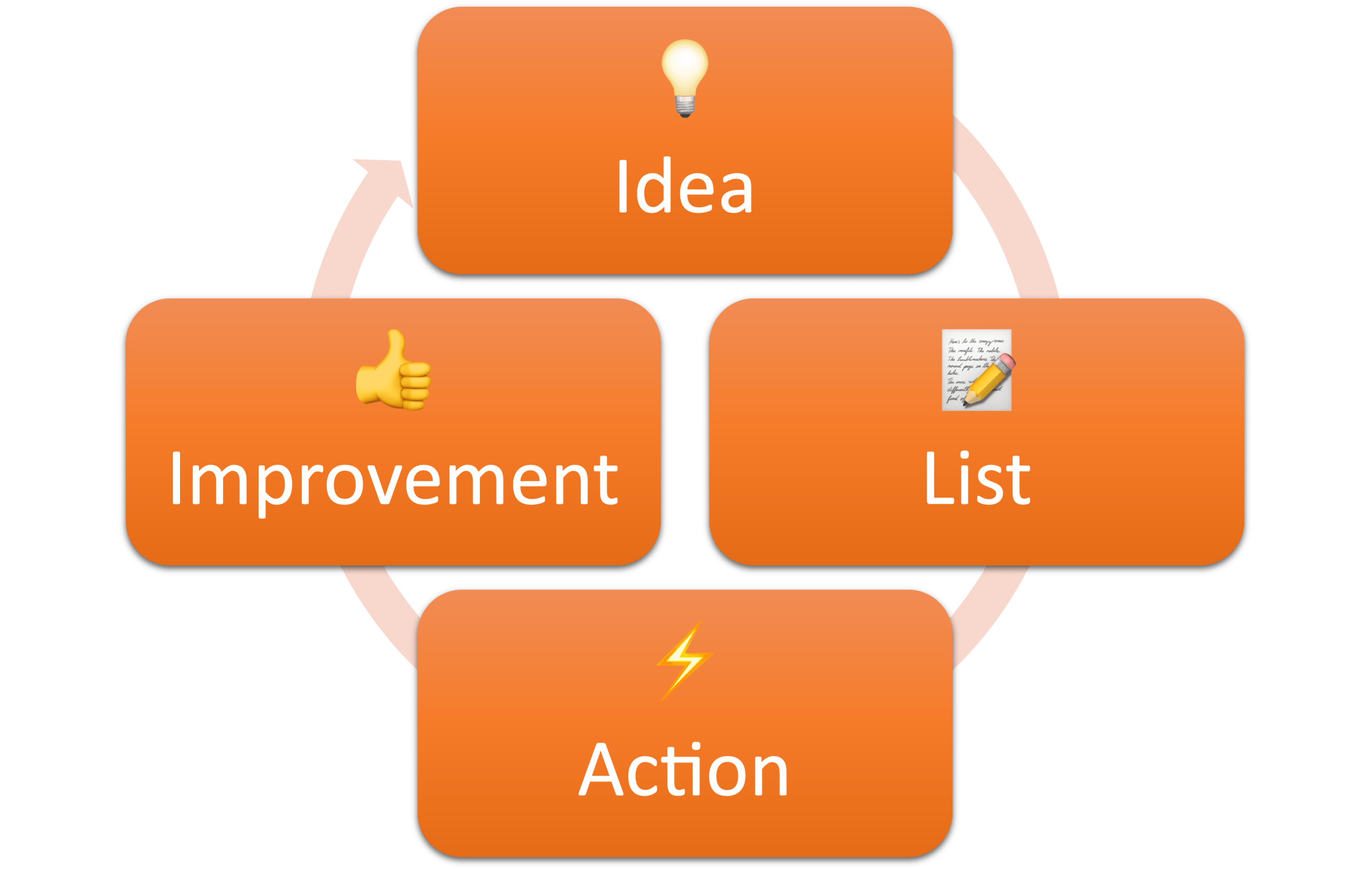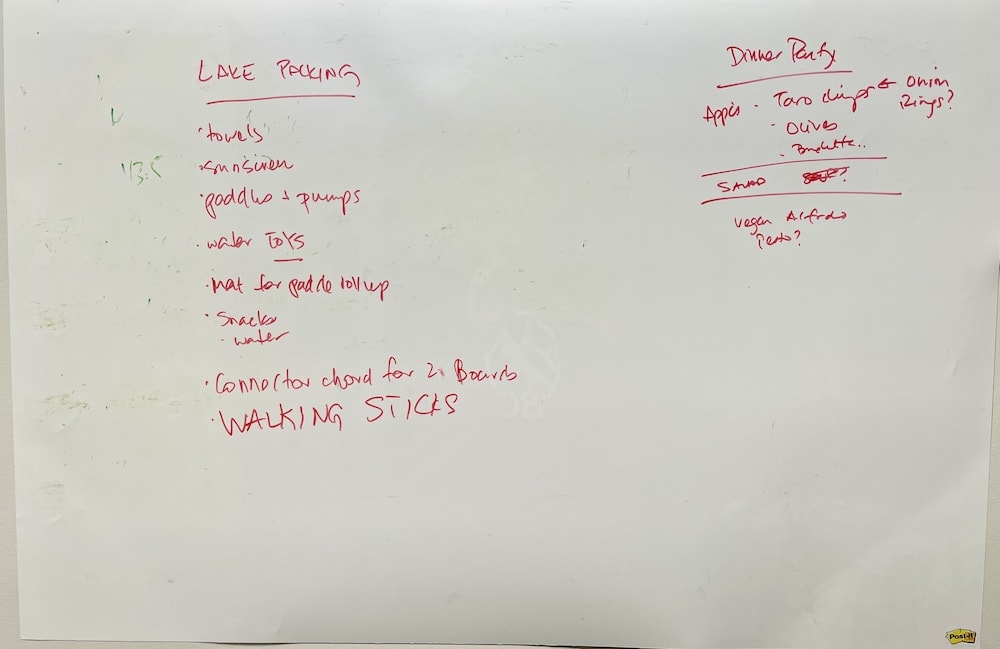Few things in life make you feel as useless as when you are standing in a parking lot with your car’s trunk open, fruitlessly trying to use a house key to cut open one of those infernal plastic ties that attach the item you just bought to its packaging.
“How,” I asked myself, “could you have possibly forgotten a knife or scissors when going solo camping? Why don’t we keep one in the car?”
Eventually, I got the item out of its package (thank you, gas station scissors). The important part of this story is not how I forgot to pack a knife (Answer: I am not bright). The important part is what I did with this information.
I wanted to make sure that I never forgot a knife again, so it went onto my Camping Improvements list.

(The pants thing is a whole other story that I talked about in my productivity and backcountry hiking article.)
Improvement Lists: My Continuous Improvement Secret Weapon
We often say that Capture is the foundation of any productivity system. We all have ideas, to-dos, and flashes of inspiration that come to us, often at the most random times.
Here’s the problem: if you don’t act on your thought right away, you will almost certainly forget it. The reasons for this vary, but research has shown that there are limits on our working memory.
So the key is to make sure you get these thoughts out of your brain and into a trusted system before they disappear.
We all want to improve our work and personal life (otherwise, why read productivity articles like this one?), but to do that, we need to know what to improve.
I have tried many different approaches and have found using simple Improvement Lists is the easiest and most effective way to translate ideas and observations into action and improvements.
The continuous improvement process goes like this:

- Notice something that needs improvement
- Capture it to the relevant improvement list
- At the appropriate time, take action to make the improvement
- Enjoy the results 👍
The Improvement List In Action
Using the Camping Improvement list as an example, here is what I had at the end of that trip:

By the time my next trip rolled around, I had:
Upgraded my sleeping pad and added it to my checklist:

Added the knife/scissors:

And you’d better believe I remembered my pants this time:

In fact, by the time my next trip rolled around, I had taken action on everything on my list and was ready for a whole new set of improvements.
So really, this is a better representation. Your improvement lists are a continuous improvement cycle:

Kaizen: An Asian Efficiency Core Value
Asian Efficiency has a set of 5 Core Values that we strive to live by, and we review one of them every day.
One of our Core Values is Kaizen, or continuous improvement.
The idea is simple: small changes lead to big results. However, making big changes all at once is tricky: it can be hard to find the time or resources, and even worse: the significant change you made may not work out the way you thought.
Making a bunch of smaller 1% changes over time is much more doable and will usually lead to better results.
We then return to our previous question: how do you know what to improve?
Improvement List Examples
The fact is, opportunities for improvement come up all day, every day. You just need to be tuned in to them.
They may come from ideas that you have. They may come from things that annoy you. They may come from comments that you overhear. They may come from customer feedback. They may come from Blog articles or Podcast episodes. They may come from products or courses.
There’s a never-ending supply of improvement ideas out there. You need two things:
- An open mind that sees things that come up as opportunities for improvement.
- An easy and convenient way to capture them before you forget them.
You’ve already seen my camping improvement list, but some other ones I keep:
- An AE Improvement list for change opportunities I observe.
- A Soccer Improvement list for the U17 soccer team I help out with.
- A Home Improvement list for things around the house that I notice (or more likely, my wife notices…)
Speaking of my wife, she put a 3M Dry-erase whiteboard film on the wall at the top of our stairs for her thinking and improvement lists. She wasn’t happy with how many things we forgot after a recent trip to a lake, so voila, an impromptu lake improvement list:

You can apply the Improvement List concept to your team as well. For example, at AE, we more-or-less follow the Scrum methodology and work in 2-week sprints.
A few years ago, we started including a Sprint Kaizen list. When we do our Sprint Meeting and Retrospective every Thursday, we make a list of improvements we want to make for future sprints.
We then review that list every day during the next sprint to ensure those improvements happen. The list varies from 2-3 improvements to more. Here’s a sample:

Item 1 made our emails more readable, which benefits our customers, and item 2 made our review process more efficient, which helped us — Kaizen for the win. Our Sprint Kaizen process has been one of our most effective continuous improvement tools.
Improvement lists pair perfectly with The 3X Rule: If an issue comes up three times or so, take action to solve the root cause so that it doesn’t happen again. If you put something on an Improvement List and you find it is (or was) already there, that’s a good sign you should take deeper action.
How To Keep An Improvement List
There are two high-level ways to use Improvement Lists:
- Keep one general list for everything
- Have multiple lists for different functions
Option 1 is easier to capture — you only have one place to save it — but I prefer Option 2. Putting all your improvements into one giant list may be easier to capture the idea, but I find when it is time to take action, it is more difficult because the list lacks context. More on that soon.
However you choose to do it, the question then becomes: where do you capture these items?
Mobile Improvement Lists
I prefer to capture my Improvement Lists on my phone, as I almost always have my device with me.
I use the app Drafts on iPhone, iPad, and Mac because it is lightning fast, easy to use, and syncs between my devices.
Unfortunately, Drafts is not available on Android or Windows, but you could use Google Keep.
When I think of an improvement, I fire up Drafts, jump to the relevant list, and add on to the list.

You don’t need to use Drafts (or Keep). Other apps like Evernote, OneNote, Apple Notes, or Obsidian will work — just make sure you can save your note quickly.
Speed of capture is more important than anything else, or you won’t use it consistently!
Paper Improvement Lists
If you prefer a less digital solution, you could keep your Improvement Lists on paper.
I carried around a Field Notes notebook to capture ideas, notes, and tasks for years. I like them because they are small and thin.
Improvement Lists also pair perfectly with a Bullet Journal by creating a Custom Collection.
Keep It As Simple As Possible!
For many of you, it will be tempting to create shortcuts and automations and all sorts of hacks to make capturing and taking action more “efficient.” Usually, I am all about nerdy stuff like that, but I recommend you keep Improvement Lists as simple as possible. The more infrastructure involved, the more likely you will get sucked into busy work, and the more distracted you’ll get.
Keep it simple: One or more lists and a process to take action on those lists. That’s it!
Turn Your List(s) Into Action
Of course, capturing improvements and not doing anything with them is useless.
They’re called Improvement Lists, not Things-I-Thought-Of Lists!
So how do you make sure you act on your improvements?
That depends on the type of list you’re keeping.
Ongoing Improvement Lists
There are some lists for ongoing improvements — items you want to take action on as soon as possible because they will make your processes or life better.
Examples of ongoing Improvement Lists would be my AE Improvements list, my Soccer Improvements list, and our Sprint Kaizen list. Of course, you could have your own versions of these in your work and life.
As we are going through our days, weeks, and Sprints, we want to make these improvements that will (hopefully!) lead to significant results over time.
The best way to surface actionable insights out of these lists is to work them into processes you already have. For example, if you do a Weekly Review (GTD or otherwise), that is a perfect time to skim through your ongoing Improvement Lists to look for new tasks or projects. You can then schedule and prioritize along with the rest of your tasks.
Event Or Context-Specific Improvement Lists
Some Improvement Lists are related to a specific context or event.
For example, you might run a team retreat or hold a client conference. Inevitably, some ideas will come up to make it better next time. You can capture them to an Improvement List specifically for those events.
Those lists will likely not be relevant in your day-to-day job. But they WILL become significant when it is time to plan your next retreat or conference.
My Camping Improvements list is similar. Nothing on that list impacts my life until I go camping again. Then the location of my Arc’teryx pants (or any pants, frankly) becomes top priority.
The Questions To Ask
When you go through your Improvement List(s), there are some questions you can ask yourself for each item:
- Does this still make sense to do? (If not, delete it! That’s one less thing for you to do.)
- Can I do it in 2 minutes or less? (Aka GTD’s “2 Minute Rule”. If it will take less than 2 minutes, just do it now.)
- Am I the right person to do this? (If not, who is?)
- When is the right time to do this? (Your Calendar becomes your best friend here)
If you aren’t sure how to prioritize the items on your lists, a tool like the ICE matrix can help.
How Do You Capture Improvements?
I’ve tried it all: capturing things to a general Inbox, using a task manager, voice notes, post-its. I have found that Improvement Lists have made the most significant difference for continuous improvement in my work and personal life.
How about you? How do you capture improvements that you observe? Do you actively look for improvements?
If you think there is room for improvement (pun intended), grab a notebook or fire up whatever notes app you are comfortable with and start keeping at least one Improvement List. Then, make sure you have a system for turning those improvements into action, and it will be “Kaizen for the win” for you too.
